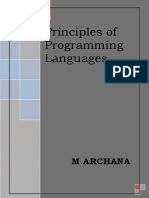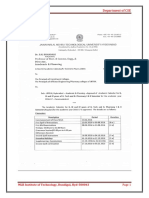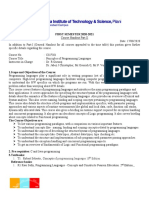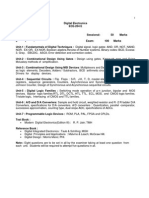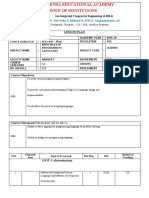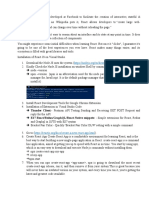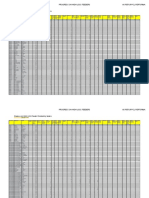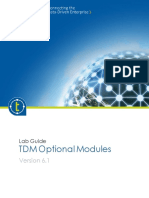0% found this document useful (0 votes)
76 views2 pagesProgramming Languages Course Plan
This document contains the course plan for CCS358 Principles of Programming Languages, a third year computer science course offered at P.S.R.R. College of Engineering. The course is designed to help students understand the syntax, semantics, data types, and basic statements of various programming languages. It will also cover object-oriented, concurrent, and event-driven programming paradigms. The course spans 5 units over 52 hours and will involve lectures, tutorials and programming assignments in Scheme, ML, and Prolog to reinforce concepts. Assessment is based on course outcomes related to describing programming language concepts and applying paradigms in different languages.
Uploaded by
Subbalakshmi PerumalsamyCopyright
© © All Rights Reserved
We take content rights seriously. If you suspect this is your content, claim it here.
Available Formats
Download as DOCX, PDF, TXT or read online on Scribd
0% found this document useful (0 votes)
76 views2 pagesProgramming Languages Course Plan
This document contains the course plan for CCS358 Principles of Programming Languages, a third year computer science course offered at P.S.R.R. College of Engineering. The course is designed to help students understand the syntax, semantics, data types, and basic statements of various programming languages. It will also cover object-oriented, concurrent, and event-driven programming paradigms. The course spans 5 units over 52 hours and will involve lectures, tutorials and programming assignments in Scheme, ML, and Prolog to reinforce concepts. Assessment is based on course outcomes related to describing programming language concepts and applying paradigms in different languages.
Uploaded by
Subbalakshmi PerumalsamyCopyright
© © All Rights Reserved
We take content rights seriously. If you suspect this is your content, claim it here.
Available Formats
Download as DOCX, PDF, TXT or read online on Scribd
/ 2














